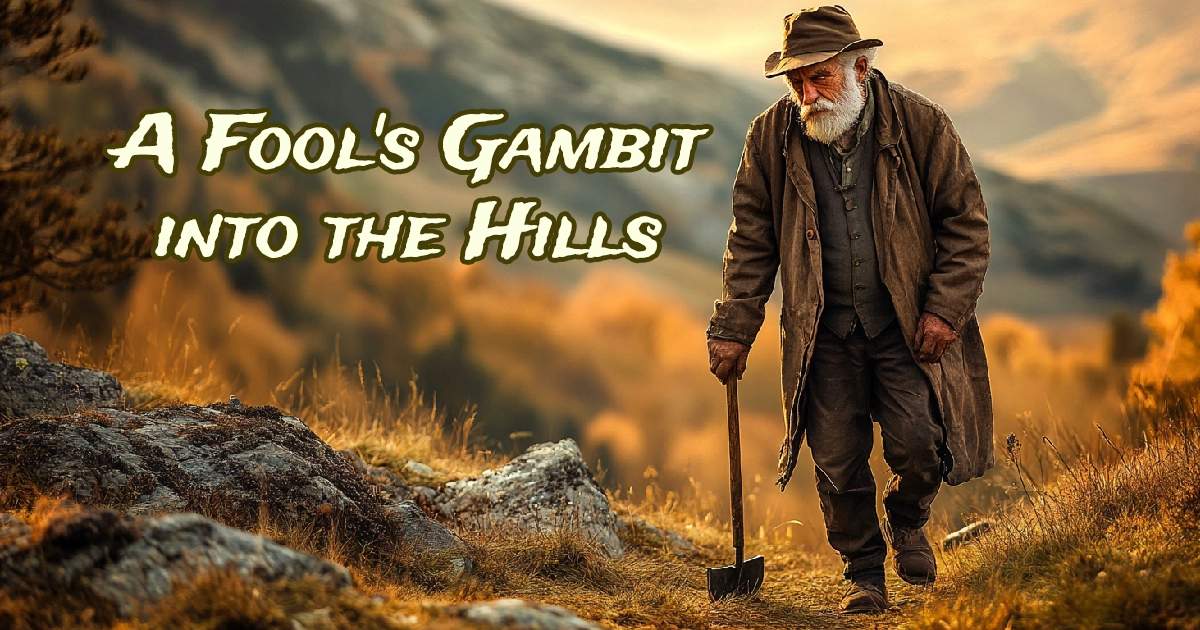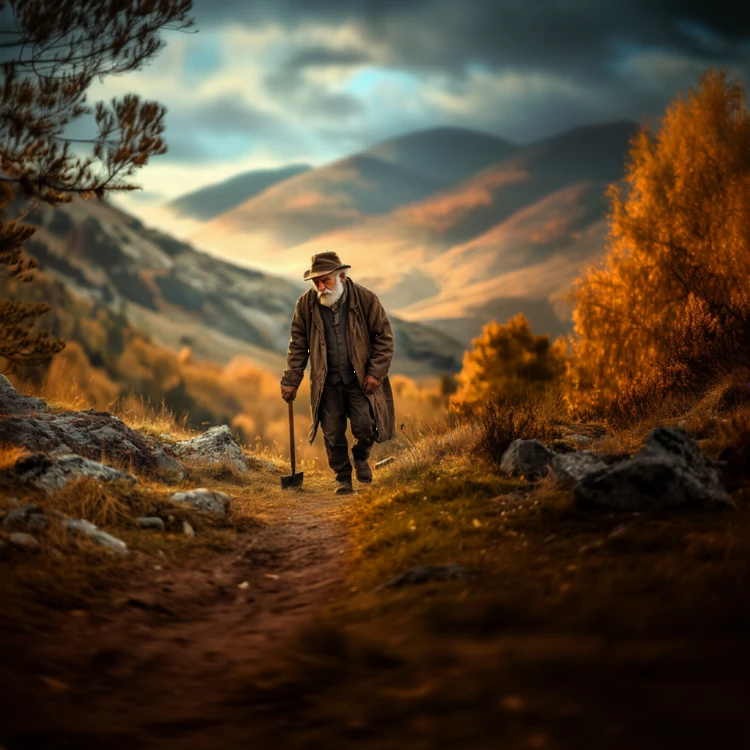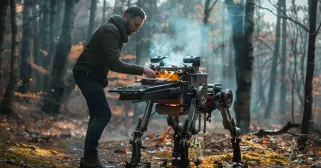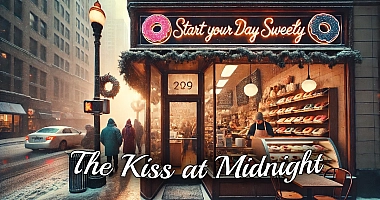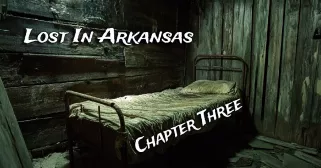Runt’s Last Gold Rush: A Fool's Gambit into the Hills
How One Old Prospector Almost Struck it Rich
A Rumor Worth Chasing
The Rusty Spur Saloon wasn’t just where Cactus Creek’s downtrodden gathered—it was where fortunes dissolved and reputations were dismantled one cheap drink at a time. For Runt, it was the only place where he could spend his evenings without the suffocating reminder of his failures—at least until the saloonkeeper decided to speak his piece.
The saloonkeeper, a wiry man with the temperament of a cactus and a face like a pickled beet, leaned across the bar, pointing a bony finger directly at Runt. His voice, sharp and unforgiving, cut through the din of clinking glasses and low conversation.
“Runt,” he barked, “your tab’s bigger than a Sunday preacher’s sermon, and I’m fresh outta charity. Pay up, or get out.”
The room went still. A few patrons turned to look, smirking into their drinks or elbowing their neighbors. Runt could feel their eyes on him—the same ones that had watched him fail at every scheme he’d ever tried. His face flushed redder than the sunburn he’d earned just sitting outside too long, and he adjusted his hat lower, hoping to disappear into the shadows of the dimly lit saloon. No such luck.
“I’ll pay it, Joe. Soon as my luck turns around,” Runt mumbled, his voice barely audible.
“Your luck ain’t got legs, Runt,” the saloonkeeper snapped. “It’s crawlin’, and it ain’t gonna reach my till anytime this year.”
The chuckles from the other patrons stung worse than any sunburn ever could. Runt fidgeted in his seat, the humiliation pooling in his gut like a bad shot of whiskey. He knew the drill: one more insult, and he’d be tossed out on his ear, just like the last time he tried to pay his tab with a pocket full of excuses.
And that’s when salvation swaggered through the door.
Big Jack burst in like a whirlwind, his boots scuffing against the warped wood floor as he staggered toward the bar. His hat sat crooked on his head, and his vest was smeared with something that might have been dirt—or last night’s dinner. Big Jack was a man of considerable size, both in stature and reputation. He’d been in and out of town more times than anyone could count, always returning with tales of adventure, half-truths, and outright lies.
But tonight, Big Jack was different. His face was flushed with excitement—or maybe the whiskey—and his grin stretched wide enough to reveal a missing tooth.
“Gold!” he roared, slamming a meaty hand on the bar. The sound echoed like a pistol shot, silencing the room. “Gold up in them hills! I seen it!”
Runt’s ears perked up. Gold. He wasn’t the only one. Every eye in the saloon turned toward Big Jack, the tension thick enough to slice with a knife. Even the saloonkeeper paused, his bony finger still pointing at Runt as his gaze shifted toward the newcomer.
Big Jack leaned against the bar, his breath reeking of booze and bravado. “I swear on my mother’s grave,” he slurred, waving his hand for emphasis. “A pay streak so rich, it’d make King Solomon jealous. Just sittin’ there, waitin’ for a man with guts to take it.”
The saloon was deathly quiet now, the kind of silence that could only mean one thing: everyone was calculating their odds of getting there first. Even the old-timers, who hadn’t swung a pickaxe in decades, looked like they were ready to sprint out the door.
Runt’s heart pounded in his chest. Gold. The word rang in his ears like a church bell. This wasn’t just a story—it was a chance. A way out. A way to wipe out his debts, restore his dignity, and maybe even earn a little respect in this dusty town.
Big Jack’s grin widened as he basked in the attention. He reached for a drink, knocking back half of it in one gulp before slumping onto a barstool. Within seconds, his snores were echoing through the saloon, his bravado giving way to the deep, unbothered sleep of a man who never thought twice about what he said—or the trouble he left behind.
The saloonkeeper’s voice snapped Runt out of his thoughts. “Well? You still here, Runt? I said pay up or—”
“I’ll pay,” Runt interrupted, standing suddenly. His voice was louder now, his confidence buoyed by a new sense of purpose. “I’ll pay. Just give me a few days.”
Joe’s brow furrowed, but he said nothing. The room was still watching, the smirks now replaced with mild curiosity.
Runt didn’t care. He had a plan. He adjusted his hat, straightened his jacket, and walked out the saloon doors with his head held high. The laughter and whispers faded behind him as he headed home to scrape together whatever he had left.
Gold was out there. Big Jack had seen it. And this time, Runt wasn’t going to let it slip through his fingers. This was his chance—his last, best chance to change everything.
Into the Hills
The next morning, Runt surveyed the remnants of his life: a bent frying pan, a sack of beans, an old coat with more patches than fabric, and a pair of boots that groaned louder than he did. It wasn’t much, but it would have to be enough. He bundled it all under his arm and trudged to the pawnbroker, a surly man whose eyes gleamed at the sight of desperation.
“You’re selling the coat?” the pawnbroker asked, his voice dripping with doubt as he held it up to the light. “This thing’s seen more winters than my grandmother.”
“Take it or leave it,” Runt replied, his tone curt but his eyes betraying his unease. He didn’t have the luxury of negotiation.
A few coins later, Runt walked out with a battered pickaxe, a canteen that smelled faintly of moonshine, and the pièce de résistance: Mabel, a donkey so ancient and disheveled she looked like she’d been exhumed rather than sold. Her fur was patchy, her ears were perpetually lopsided, and her eyes had the dull, indifferent stare of someone who’d seen enough of life and wasn’t impressed.
“Well, girl,” Runt said, patting her flank. “You and me are gonna make history.”
Mabel snorted, as if to say, We’ll see about that.
They set off before sunrise, the town of Cactus Creek shrinking into the hazy distance behind them. Runt’s boots kicked up small clouds of dust with every step, the rhythmic plod of Mabel’s hooves a metronome to his thoughts. With every mile, he envisioned the treasure waiting for him: gold glinting in the sunlight, enough to silence his doubters and fill his pockets forever.
But the hills were merciless. The sun climbed higher, turning the dirt trail into a furnace. The air shimmered like molten gold, but the only thing Runt felt was the sweat pooling under his hat and trickling down his spine. By midmorning, he’d drained most of the water in his canteen and was eyeing the horizon for shade. Mabel trudged along without complaint—until she didn’t.
At a particularly steep stretch of the trail, Mabel stopped dead in her tracks. Her ears twitched, her body stiffened, and her hooves seemed to meld with the ground.
“C’mon, girl,” Runt said, tugging at her reins. “There’s gold up there. You’ll get a whole sack of oats if we strike it rich.”
Mabel’s only response was a slow flick of her ear. Her expression was clear: I’m not moving, and you can’t make me.
Runt sighed and leaned against her for a moment, his energy sapped by the relentless heat. But desperation is a powerful motivator, and after a few minutes of coaxing, pleading, and a gentle shove to her backside, Mabel let out a disgruntled bray and lurched forward.
Runt grinned. “Knew you’d see reason.”
But Mabel wasn’t the hills’ only challenge. As they ascended, the trail grew narrower and the footing more treacherous. Rocks shifted under their weight, and dust swirled around them, stinging Runt’s eyes. The heat had long since turned unbearable, but Runt pressed on, his mind consumed by visions of riches.
Then came the real blow. As they rounded a sharp bend, the saddlebag shifted, and Runt heard the sickening clatter of his canteen hitting the rocks. He turned just in time to see it tumble down the slope, spilling what little water was left before coming to rest far below.
Runt cursed loudly, the words echoing off the cliffs. He scrambled down a few feet, but the steep incline made retrieving the canteen impossible. He kicked a rock in frustration, sending it tumbling after the canteen, then turned back to Mabel, who was chewing a scraggly bush as if oblivious to their predicament.
“Well, girl,” he muttered, wiping sweat from his brow, “guess we’re in it now.”
By the time they reached the ridge, the sun was low on the horizon, painting the valley below in hues of orange and red. It was beautiful, in a stark and lonely way. But Runt barely noticed. His throat was dry, his legs felt like lead, and the promise of gold was the only thing keeping him upright.
Mabel found a tuft of grass to chew and flopped onto her haunches with a groan, clearly deciding she’d had enough for the day. Runt, however, was far from finished. He squinted at the valley, scanning every crevice and shadow as if the gold might leap out and announce itself.
“This is it,” he whispered, gripping his pickaxe with trembling hands. “I can feel it.”
He swung with the desperation of a man clinging to his last shred of hope. The clang of metal against rock echoed in the stillness. Dust rose in clouds around him, sticking to his sweaty skin. Every glint of sunlight off a pebble made his heart leap, only to sink again when it turned out to be nothing but mica.
Hours passed, and his strikes grew weaker, but Runt didn’t stop. He couldn’t stop. The promise of gold, the whisper of Big Jack’s tale, the thought of returning to Cactus Creek empty-handed—it all pushed him forward.
As the stars began to appear in the night sky, Runt leaned on his pickaxe, his chest heaving. The ridge was littered with rocks and dirt, but the gold he dreamed of was nowhere to be seen. Mabel snorted softly behind him, as if to say, Told you this was a fool’s errand.
But Runt wasn’t ready to give up. Not yet. He’d made it this far, and no stubborn donkey or empty canteen was going to stop him.
“Tomorrow,” he muttered to himself. “Tomorrow’s gonna be the day.” And with that, he collapsed onto the ground, too tired to care that the dirt would be his bed for the night.
A Glimmer of Hope
By the third day, Runt’s body felt like a collection of splinters held together by sheer stubbornness. His hands were blistered from the pickaxe, his shoulders ached from the relentless swinging, and his stomach gnawed with the hunger of a starving coyote. The stale biscuits in his bag were long gone, and the only thing keeping him upright was a fragile cocktail of hope and desperation.
“Just a little more,” he muttered, his voice hoarse. “A little more, and I’ll strike it rich.”
The hills, however, had no intention of making things easy. Each swing of the pickaxe sent vibrations rattling up his arms, and the rocks beneath him seemed harder than steel. His vision blurred as sweat dripped into his eyes, and his legs felt like they might buckle at any moment. But Runt didn’t stop. He couldn’t. Not when the promise of gold was so tantalizingly close—or so he believed.
He aimed a heavy blow at a particularly stubborn rock, and this time, the ground beneath him answered back. A low, ominous groan rose from the earth, like a warning. Runt froze, his pickaxe mid-swing.
“Uh-oh,” he whispered, just before the ground gave way.
The world tilted, and Runt felt the terrifying rush of falling. He tumbled down into darkness, the air filled with the sound of crumbling dirt and the clatter of his pickaxe against stone. He hit the bottom with a bone-jarring thud, his breath knocked out of him.
For a moment, all was still. The silence pressed in around him like a suffocating blanket, broken only by the faint trickle of loose dirt settling above. Pain radiated through his body, and he groaned, rolling onto his back.
“Runt,” he muttered, his voice echoing in the narrow space. “You’ve really done it now.”
He sat up slowly, wincing as his joints protested. The crevice was narrow and dark, the only light coming from the jagged hole above. His pickaxe lay a few feet away, half-buried in dirt. Gingerly, Runt climbed to his feet and ran his hands along the rocky walls, searching for a way out—or, at the very least, something to hold on to.
His fingers brushed against something cold and metallic. He froze, his heart leaping in his chest. Hope surged like a wildfire, and he began clawing at the dirt with his bare hands, digging frantically. His breath came in ragged gasps as he unearthed a small, round object.
It was a coin. Tarnished, dull, and clearly old, but a coin nonetheless. Runt stared at it for a long moment, his excitement evaporating like morning dew. It wasn’t gold. It wasn’t even worth much—just a relic dropped by some long-forgotten miner.
He let out a bitter laugh that echoed off the walls. “Figures,” he said, slumping against the rocky wall. “All this work for a lousy coin.”
But as he sat there, wallowing in his frustration, something caught his eye. A faint, unmistakable glimmer in the wall, almost hidden by the shadows. His breath hitched. It was small, barely visible, but it was there.
Gold.
Runt scrambled to his feet, his exhaustion momentarily forgotten. With trembling hands, he retrieved his pickaxe and began chipping away at the stone, his movements frantic but careful. The glimmer grew brighter with each swing, until finally, with one last strike, a small nugget of gold popped free.
It wasn’t much—barely the size of a pebble—but it was real. Runt cradled it in his hands, staring at it with a mixture of disbelief and triumph. His chest swelled as a wide grin spread across his dirt-streaked face.
“I knew it,” he whispered, his voice shaky. “I just knew it.”
For a moment, he forgot about the hunger gnawing at his belly, the blisters on his hands, and the seemingly insurmountable climb back to the surface. All he could see was the gold, glinting in the faint light like a promise fulfilled.
The Legend of Runt
When Runt finally staggered back into Cactus Creek, he was a walking spectacle. His clothes were more holes than fabric, hanging off him like scarecrow rags. Dirt clung to every inch of his skin, and his hair jutted out in wild tufts, stiff with dust and sweat. His boots, already on their last legs when he’d left, were now split open at the toes, flapping with every step like a pair of worn-out jaws. Yet despite his haggard appearance, Runt carried himself with the swagger of a man who had just struck gold—because, for once, he had.
The Rusty Spur Saloon was packed that evening, filled with miners nursing their drinks and gamblers trying to hustle them out of their last few coins. When Runt pushed through the swinging doors, the room went quiet, all eyes turning to the disheveled figure in the doorway. He was clutching something in his hands, and his wild-eyed grin suggested he’d found the answer to every prayer he’d ever mumbled.
“Gold!” Runt roared, his voice raw from days of shouting into the empty hills. He staggered to the bar and slammed his prize down with a triumphant thud. The nugget gleamed faintly in the saloon’s dim light, its golden hue unmistakable. “I found it! Up in them hills, just like I said!”
For a moment, the room was silent. Then the chaos began.
Miners leapt from their seats, overturning chairs and spilling drinks in their rush to get a closer look. The poker game in the corner dissolved into a flurry of hastily abandoned cards. Someone shouted, “It’s real!” while another yelled, “That’s fool’s gold, I’ll bet!” Arguments broke out over who had rights to which part of the hills, even though nobody had yet left the saloon. Big Jack, nursing a hangover at the far end of the bar, pushed his way to the front, squinting at the nugget.
“That’s my claim!” Jack slurred, jabbing a finger in Runt’s direction. “I told you about that gold, you dirty thief!”
Runt chuckled and leaned against the bar, his grin widening. “You told me a lot of things, Jack,” he said, “but it wasn’t your pickaxe that dug this beauty outta the ground.”
The saloon erupted into more shouting, but Runt didn’t care. He had what he’d always dreamed of—not just gold, but the attention, the admiration, and the envy of the town. He waved down the saloonkeeper, who approached with a look of mingled suspicion and awe.
“Give me your best,” Runt said, tossing a few tarnished coins onto the bar. “And keep the rest for my tab.”
The saloonkeeper didn’t argue. He poured Runt a drink, amber and smooth, nothing like the swill he usually served. Runt raised his glass, his dirt-streaked hand trembling slightly as he downed the liquor in one gulp. The burn felt like vindication.
Before long, people were pressing in, demanding details. How had he found it? Where exactly had he been digging? Was there more? Runt leaned into the moment, spinning a tale that grew grander with every telling. He described treacherous cliffs, hidden veins of gold that glimmered in the moonlight, and a near-death escape from a collapsing crevice.
“I almost didn’t make it,” he said, holding up his blistered hands for emphasis. “But I knew—knew—that gold was mine. And let me tell you, boys, there’s more where that came from.”
He didn’t mention the days of failure, the hunger that gnawed at his belly, or the size of the nugget, which was barely larger than a robin’s egg. None of that mattered. What mattered was the dream—the dream he’d just reignited in every soul in that saloon. He could see it in their eyes, the way they leaned in, their minds already racing ahead to their own fortunes.
Dreams were free, and Runt had plenty to go around.
By the end of the night, the saloon was abuzz with plans. Miners were packing their gear, gamblers were betting on who’d find the next big strike, and the townsfolk were spinning their own tales about what lay hidden in the hills. Runt sat back with his second drink in hand, watching the frenzy with a satisfied grin.
For the first time in his life, he wasn’t the fool in the room. He was the man with the gold, the man with the story, the man who had come back from the hills as a legend. And as long as nobody asked too many questions, he planned to enjoy every minute of it.
A Fool and His Fortune
The gold rush Runt had ignited swept through Cactus Creek like wildfire. The hills buzzed with the sound of pickaxes striking stubborn rock and the shouts of prospectors staking dubious claims. Tents popped up overnight, and the narrow trails leading to the hills were clogged with wagons loaded with gear and dreams. From dawn until dusk, men clawed at the earth with the fervor of the desperate, each convinced they were one swing away from their fortune.
But the gold never came.
As day after day passed and hole after hole turned up empty, the enthusiasm began to wane. Frustration spread like a bad case of poison ivy, and with it came the rumors. Some claimed Runt’s nugget was nothing more than fool’s gold, glittering but worthless. Others accused him of salting the hills, scattering flecks of gold dust to lure gullible miners into a wild goose chase. Big Jack, still nursing his bruised ego, loudly insisted that Runt had stolen the nugget outright.
Runt, however, was unbothered. Sitting on the porch of the Rusty Spur, he watched the chaos with a faint smile and a glint of amusement in his eye. His nugget might not have been enough to buy him a mansion, but it had earned him something far more valuable: notoriety. For the first time in his life, Runt wasn’t just a name people scoffed at. He was the man who’d found gold—real or not, it didn’t matter. He’d become a legend.
With the modest earnings from his nugget, Runt treated himself to a few luxuries. He bought a brand-new pair of boots that didn’t pinch his toes or threaten to fall apart with every step. He added a feathered hat to his wardrobe, its jaunty plume swaying as he strolled through town, and splurged on an extra bag of oats for Mabel, who eyed him with what might have been grudging respect. For once, Runt felt like the kind of man he’d always imagined himself to be: a success.
The hills, it turned out, weren’t hiding any great fortune, but Runt didn’t care. He’d found something better. With his newfound reputation, he became the unofficial storyteller of Cactus Creek, his exploits growing grander with each retelling. Perched on a rickety chair outside the saloon, he held court like a king, spinning tales for anyone who’d listen. Wide-eyed children hung on his every word, while skeptical miners nodded along, half-believing and half-entertained.
“And then,” Runt would say, lowering his voice to a conspiratorial whisper, “just as the whole ridge was about to cave in, I saw it—a vein of gold as thick as a mule’s leg, gleamin’ in the moonlight. Took every ounce of grit I had to chip that nugget free before the ground gave way. Thought I was a goner for sure.”
The children gasped, their imaginations filling in the gaps where the truth fell short. The miners exchanged knowing smirks, but none of them walked away. There was something about the way Runt told his stories—how he leaned in close, his voice full of conviction, his eyes twinkling like the gold he’d claimed to find—that kept them hooked.
Sometimes, late at night when the saloon was quiet and the hills were shrouded in moonlight, Runt would reach into his pocket and pull out what was left of his nugget. The shine had dulled from handling, and it was smaller than he liked to admit, but it was still gold. He’d turn it over in his fingers, smiling to himself.
The nugget, he knew, wasn’t what made him rich. It wasn’t the gold itself that had changed his life, but the story it had given him. The story had brought him respect, admiration, and a place in the hearts of the townsfolk. For a man like Runt, who’d spent his whole life chasing dreams just out of reach, the gold had been a gift—not because of its value, but because it had made him believe in something bigger.
And so, Runt continued to tell his tales, each one more embellished than the last. He didn’t care if people believed him or not. What mattered was the way their faces lit up when he spoke, the way their eyes sparkled with a mix of wonder and disbelief. That was his real fortune.
As for the hills, they eventually quieted, the prospectors moving on to chase new rumors in other towns. But Runt stayed right where he was, his nugget tucked safely in his pocket and his stories etched into the fabric of Cactus Creek.
For Runt, the hills hadn’t given him riches. They’d given him something far better: a legacy. And for a man who’d spent most of his life overlooked and underestimated, that was worth its weight in gold.
